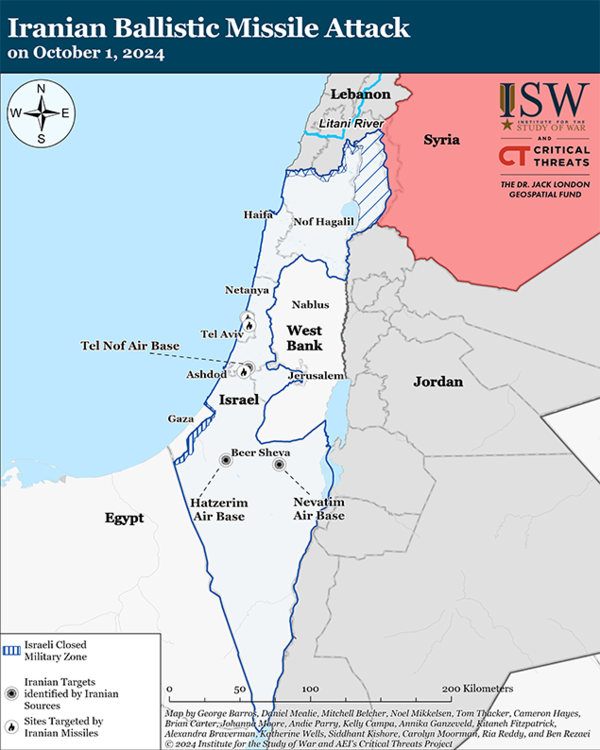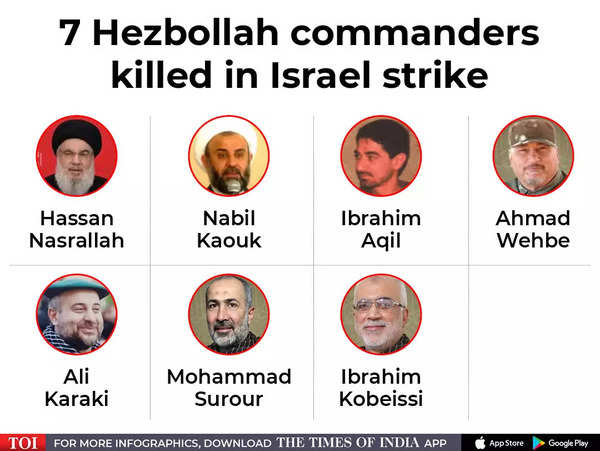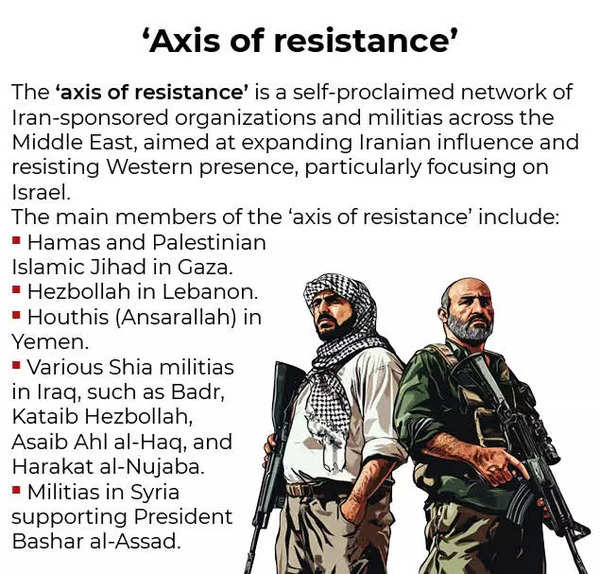Iran announced on Wednesday that its missile attacks on Israel, its most significant military action against the Jewish state, have ended unless there are any further provocations. Meanwhile, Israel vowed to retaliate against Tehran, raising concerns about a possible wider conflict.
running news
- In a statement, Iranian Defense Minister Brigadier General Aziz Nasser Zadeh claimed that Iran carried out attacks on Israeli “military, operational and intelligence” centers believed to be linked to the assassination.
Hamas Leader Ismail Haniyeh. - According to ISW reports quoting Iranian media, the following airbases in Israel were targeted:
- Nevatim Air Base, located near Beersheba, Israel, is home to the Israeli F-35.
- Hatzerim airbase, located in the Negev desert, was also targeted.
- Additionally, Tel Nof airbase, located 20 kilometers south of Tel Aviv, was also targeted.
- Israel is deliberating its response to Iran’s latest missile attack. With the stakes higher than ever, the Israeli Prime Minister
benjamin netanyahu vowed that Tehran would face serious consequences, saying Iran had “made a big mistake” and “will pay for it.” - Meanwhile, the US is pushing for a measured Israeli response to avoid a wider regional war, but its influence in shaping Israel’s next steps may be limited.
- This latest round of hostilities threatens to escalate far beyond the Israel-Palestine conflict, drawing in regional powers like Iran and raising the specter of full-scale war across the Middle East.
- Iran’s move is being seen as a calculated risk aimed at both showing solidarity with its allies
Hezbollah And Hamas is also testing the resolve of Israel and its American ally.

why it matters
- Iran’s participation in a direct missile attack on Israel dramatically increases the threat. Israel has long been engaged in a shadow conflict with Iran, marked by cyber attacks, covert operations and proxy wars. Now, the shadow war risks turning into open conflict.
- The surge comes as the US is engaged in one of the most polarized, closely contested presidential elections in its history.
- Meanwhile, America is also trying to deal with several geopolitical crises. As Washington grapples with its response to Russia’s war in Ukraine and China’s growing assertiveness, it now faces the prospect of being deeply embroiled in another Middle Eastern conflict.
- The Biden administration is attempting to avoid a new war in the region, and is urging Israel to avoid large-scale retaliation that could trigger a wave of violence. Nevertheless, the US has pledged unwavering support for Israel’s security, and how it balances these two positions will be critical in shaping the next phase of this conflict.
big picture
- Although Iran’s missile bombardment failed to cause significant damage, it nevertheless changed the trajectory of the conflict. Iran, bolstered by its strategic alliances with Hezbollah, Hamas and other regional militias, is trying to establish itself as a major player in the resistance against Israel. Tehran’s leadership framed its missile attack as a justifiable retaliation for Israel’s recent killing of senior Hezbollah figures, including its leader Hassan Nasrallah. Iranian officials have threatened further attacks if Israel retaliates, warning that such actions would invite “crushing attacks” on Israeli infrastructure.
- The United States has responded to the situation by reaffirming its commitment to Israel’s security. While the Biden administration has been actively involved in supporting Israel’s defense efforts – particularly through joint missile defense systems – it is also keen to prevent a regional war. Washington has been working behind the scenes to moderate Israel’s response, insisting that Iran’s missile strikes, although a significant escalation, have not achieved their intended objectives.
- Nevertheless, none of these efforts would prevent Israel from retaliating. Netanyahu’s tough rhetoric suggests a strong military response is almost certain. Now the question is how far will Israel go in its retaliation. In the past, Israel has responded to Iranian provocations with targeted attacks against specific military installations, seeking to avoid broader tensions. However, the scale of Iran’s missile attack this time could prompt Israel to take more aggressive action, including attacks on Iran’s nuclear facilities or key infrastructure.
Can Israel run out its course? regime change in iran,
In a video message on Monday, Israeli PM Netanyahu announced that a change in Iran’s government is imminent. He said that the time when “Iran will finally be free” will come much earlier than anticipated.
Netanyahu criticized the “fanatic religionists” currently ruling Iran. He expressed confidence that once the Iranian regime is overthrown, relations between the two countries will change significantly.
Netanyahu stressed the possibility of a new era of harmony between the two countries, saying, “Our two ancient peoples, the Jewish people and the Persian people, will finally live in peace. Our two countries, Israel and Iran, will be in peace.” , once the current Iranian leadership is no longer in power.
But can Israel bring about regime change in Iran? Israel’s military approach of targeting key figures and infrastructure has met with some success in its ongoing war with Hamas and Hezbollah. Hezbollah’s capabilities, particularly in southern Lebanon, have been significantly diminished. With Hezbollah on the backfoot, Israel may feel emboldened to strike deep into Iran’s infrastructure or even its leadership, with the aim of disrupting its political core.

However, Israel’s past experiences with Hamas and Hezbollah show that although the collapse of leadership can cripple terrorist organizations, it rarely leads to the collapse of the broader structures that sustain them.
While Israel’s intelligence and technological capabilities are superior, Iran has the resources and institutional depth to withstand the loss of leadership.
Furthermore, the risks of full-scale war with Iran remain a significant deterrent, especially without assured US military support. Norman Raoul, a former US intelligence official on Iran, told the Wall Street Journal: “Israel will try to reinforce the idea that its technological superiority and military prowess allow it to attack any target in Iran.” But “war with Iran would require political, economic, and military support, if not involvement, of the United States,” Ruley said.
A major Israeli attack on Iran’s nuclear facilities or economic infrastructure could provoke a major conflict, and potentially accelerate Iran’s nuclear ambitions. Raoul warned, “Such an airstrike could provoke Tehran to launch a major missile attack, carry out terrorist attacks against Israeli interests abroad and expand its nuclear program, which would make it easier for Iran to build a bomb.” The path will become faster.”
Ultimately, while Israel may successfully weaken Hezbollah and target Iranian leadership figures, the broader question of whether military force alone can bring about regime change in Iran is questionable. History shows that although decapitation attacks can weaken opposing forces, they rarely lead to political upheaval. Iran’s deep institutional strength and the support it receives from regional representatives known as the ‘axis of resistance’ make it unlikely that airstrikes alone could topple the regime.

what are they saying
- US National Security Advisor Jake Sullivan acknowledged the seriousness of Iran’s missile attack, calling it a “significant escalation”. However, he stressed that it was “ultimately defeated and ineffective” due to the combined efforts of Israeli and US missile defense systems. Despite the attack’s failure to cause significant damage or casualties, the symbolism of Iran’s action cannot be overstated. It represents a bold step by Tehran to assert itself in the ongoing conflict and send a message that it will not stand idly by while its allies in Hezbollah and Hamas come under attack.
- Jonathan Panikoff, a former US intelligence official at the Atlantic Council, warned that the region is at a turning point. “The challenge of avoiding regional war is at its most difficult point since October 7,” Panikoff told the WSJ. Panikoff also highlighted the limits of American diplomatic leverage, particularly in light of the administration’s struggle to broker a ceasefire between Israel and its adversaries in Gaza and Lebanon. Panikoff underlined the difficulty of deescalating the current situation, saying, “The US already lacks sufficient diplomatic leverage to force a ceasefire in Gaza and Lebanon.”
what will happen next
- Israel’s response to Iran’s missile attack will be crucial in determining the future course of the conflict.
- The Biden administration has promised to ensure that Iran faces “severe consequences” for its actions, though the specifics of those consequences are unclear. Some analysts suggest that imposing sanctions on Israel or increasing military support could be part of the US response. However, any US involvement risks deepening the conflict, especially if Iran retaliates against US forces or interests in the region.
- Israel’s challenge will be to strike a balance between deterring further Iranian aggression and avoiding actions that could escalate the conflict beyond its control.
(with inputs from agencies)

















